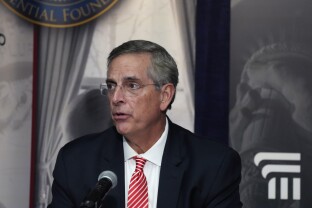ATLANTA — Two of Georgia’s top elections officials told NOTUS they feel better positioned to combat mistrust and public fury than they did four years ago, when they fended off a barrage of MAGA threats and intimidation from Donald Trump himself.
Secretary of State Brad Raffensperger sat down with NOTUS for an interview at a fortified government building as polls closed in Georgia, where he pointed to a live feed of incoming data from polling stations, with a meter showing that 1,075,765 people had checked in to vote on Election Day alone — adding to the 4 million who’d already done so in previous weeks.
“My biggest concern about today?” Raffensperger said, repeating the question posed as he looked away for a moment.
“It’s now just buttoning it up and getting the numbers done,” he said. “It’s about rebuilding trust. Because we knew the results that we had in 2020 were accurate, and we’ve gone through and checked over the years and every allegation … was checked out.”
Raffensperger was the state official Trump called in January 2021 to try pressuring him to scrounge up 11,780 nonexistent votes to flip the results there. In a memoir years later, he would later discuss the intimidation campaign and the threats his family endured.
One person with firsthand knowledge of internal conversations at the Georgia Secretary of State’s office noted that the team largely remains the same and described them as “trauma buddies.”
Raffensperger acknowledged that the challenges will likely come, but this time, he said they’re actually ready for them. The office’s lawyers have spent four years fighting against Trumpist conspiracy theorists in public, election integrity advocates in court and even against what is now a MAGA-controlled state elections board that tried and failed to institute changes that would slow down and complicate the tallying and certification of voting results. The inevitable challenges will be dealt with if they come, he said.
“They can, but neither side would have any ground to stand on,” he said. “We’ve had time. And we’ve been consistent. Facts are on our side. At the end of the day, good always triumphs over evil. The truth always wins out over a lie.”
To some, Raffensperger is an enigma. He’s a Republican who supported Trump yet stood up to MAGA conspiracy theories about election fraud, then instituted stricter election measures in the name of “election security” that drew criticisms of voter suppression and attracted a civil rights lawsuit from the Justice Department. He hasn’t publicly ruled out voting for Trump this time around, and when Trump won the GOP nomination earlier this year, he responded with a shrug and said, “It is what it is.”
Raffensperger puts on a confident and joyful persona when discussing recent voter turnout, boasting about secure polling places that faced minimal disruption — despite a last-minute bomb hoax today that the FBI linked to Russia. Yet he wouldn’t utter Trump’s name when asked about the high possibility of challenges coming from the Republican presidential candidate who has spent months claiming rampant fraud is underway.
“When people don’t accept the results, and we’ve seen it from Stacey Abrams, and we saw it in 2020, people want to lean into that, because you’re so committed to that person you can’t believe — how is that possible we didn’t win?” he said.
Another key player at the state agency, Chief Operating Officer Gabriel Sterling, sounded similarly buoyant in an interview with NOTUS Tuesday night. The public rarely notices government bureaucrats who occupy that role, but Sterling drew national attention during a press conference four years ago when he angrily blasted Trump for fueling conspiracy nonsense, called MAGA acolytes “complicit” and barked, “It has to stop.”
Sterling pointed out that recent polls show that some 80% of Georgians are ready to accept the election results this year, regardless of who wins. Sterling sees that as a hard-won victory in earning public trust that could serve as a bulwark this time around.
But even he noted that the danger persists.
“The fertile ground is still there … and they continue to till it, because it’s good for their politics and it makes money,” he said, rushing through an underground hallway as the clock ticked toward closing time for polls at 7 p.m.
He pushed a stairway door open as he held a cell phone in one hand and a red can of Coca-Cola in another.
“And money,” he said, “is one helluva drug.”
—
Jose Pagliery is a reporter at NOTUS.
Sign in
Log into your free account with your email. Don’t have one?
Check your email for a one-time code.
We sent a 4-digit code to . Enter the pin to confirm your account.
New code will be available in 1:00
Let’s try this again.
We encountered an error with the passcode sent to . Please reenter your email.


